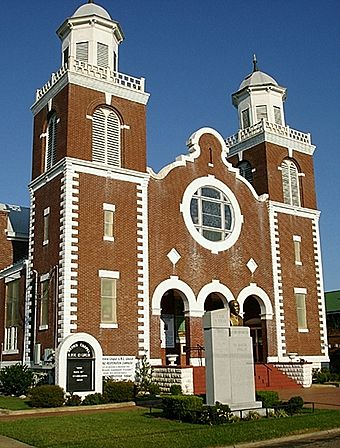Brown Chapel A.M.E. Church (Selma, Alabama) facts for kids
|
Brown Chapel African Methodist Episcopal Church
|
|

Brown Chapel African Methodist Episcopal Church, taken in 2000.
|
|
| Location | 410 Martin Luther King, Jr., Street, Selma, Alabama |
|---|---|
| Area | less than one acre |
| Built | 1908 |
| Architect | A. J. Farley |
| Architectural style | Romanesque Revival |
| NRHP reference No. | 82002009 |
Quick facts for kids Significant dates |
|
| Added to NRHP | February 4, 1982 |
| Designated NHL | December 12, 1997 |
Brown Chapel African Methodist Episcopal Church is a very important church in Selma, Alabama. It is located at 410 Martin Luther King Jr. Boulevard. This church was a key starting point for the Selma to Montgomery marches in 1965. It also served as the main meeting place and offices for the Southern Christian Leadership Conference (SCLC) during the Civil Rights Movement in Selma.
The events that happened here helped lead to the Voting Rights Act of 1965. This law made it illegal to stop people from voting because of their race. The country's reaction to the "Bloody Sunday" march, which started from this church, helped make this important law possible.
Brown Chapel was added to the Alabama Register of Landmarks and Heritage on June 16, 1976. Later, it was named a National Historic Landmark on February 4, 1982. This means it is a place of great historical importance to the United States.
Contents
What Does Brown Chapel Look Like?
Brown Chapel A.M.E. Church is just northeast of downtown Selma. It is a large building made of red bricks with white stone details. The church's style is called Romanesque Revival. It is built in the shape of a Greek cross, which means it has four arms of equal length.
The front of the church has three rounded arches where the entrances are. On each side of the front, there are tall square towers. These towers have eight-sided tops and small domes. The only big change to the outside is an addition at the back. This part holds a kitchen and other useful rooms.
A Church with a Big History
The church building was finished in 1908. It was designed by an architect named A. J. Farley. The church's congregation, or group of members, started from a mix of African-American and white Methodists. They separated into different churches in 1866. The first church building on this spot was built in 1869.
Brown Chapel is most famous for its role in the Civil Rights Movement. This was a time in the 1950s and 1960s when people worked to gain equal rights for all Americans. The Southern Christian Leadership Conference (SCLC) used the church as its main office in Selma. This group was very important in organizing protests in 1964 and 1965. These protests helped lead to the passage of the Voting Rights Act of 1965.
Protecting This Important Place
Sadly, the church building was empty for a while during the COVID-19 pandemic. During this time, it was badly damaged by termites and mold. Because of this damage, Brown Chapel was put on a special list in 2022. This list, called America's 11 Most Endangered Places, highlights important historic places that are at risk. Efforts are being made to repair and protect this historic church for future generations.
See also
 In Spanish: Iglesia AME de Selma para niños
In Spanish: Iglesia AME de Selma para niños
- List of National Historic Landmarks in Alabama
- Selma, a 2015 movie about the marches
- National Voting Rights Museum
 | Isaac Myers |
 | D. Hamilton Jackson |
 | A. Philip Randolph |



